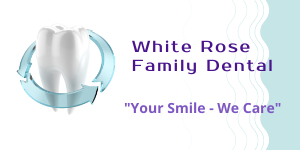A dental emergency is an issue involving the teeth and supporting tissues that needs immediate professional care. Dental emergencies may not always involve pain, although this may be a common signal that something is wrong and needs to be looked at by a dentist.

If you have a dental problem, we are here to help. Request an appointment at White Rose Family Dental LLC by clicking here or calling our team at 717-822-0272.
According to a recent study published in the journal of orofacial pain, about 35 percent of people reported having experienced sudden, severe orofacial pain in the previous six months, showing just how common dental emergencies can be. Even patients that go to a dentist every 6 months and are particularly diligent in their oral hygiene practices can also suffer from sudden dental emergencies.
The following situations constitute a dental emergency:
Severe Toothache
Sudden and unexplained toothache is the most common dental emergency. Each tooth has a bundle of nerves in its core called the pulp chamber. If a cavity is left untreated or if the tooth has sudden trauma (tooth fracture), the underlying nerves can be exposed to bacterial attack leading to severe throbbing toothache. Sometimes if the tooth has a history of extensive dental work like a deep filling, a dental crown, or even a poorly done root canal treatment, the nerve inside the tooth can suddenly be infected, leading to an episode of excruciating toothache.
Pain can originate from the tooth and surrounding tissues or can have the sensation of originating from the teeth but be caused by an independent source other than the teeth and gums (like sinus involvement or jaw pain or nerve pain, or even from conditions like shingles)
When you experience sudden and unexplainable tooth pain, find a qualified emergency dentist in York, PA, to help diagnose and treat the issue.
Here’s what you could do in case you face a severe toothache:
- Apply a cold compress or ice if the area is swollen.
- Rinse your mouth with saltwater to remove food debris packed in the cavity.
- Use over-the-counter pain medication to help reduce discomfort.
- If you suspect an infection evidenced by rising temperature or severe throbbing pain, request an antibiotic prescription from your dentist/family physician.
Gum infection, bleeding or puffiness:
Although localized and occasional gum bleeding is not a dental emergency, gums that won’t stop bleeding, especially if accompanied by pain and swelling, can indicate an underlying dental or systemic health issue. Accumulation of plaque and calculus causes heavy irritation of the gums, causing them to bleed and hurt. This condition is called Gingivitis. Gingivitis can cause dusky red, swollen, and tender gums that bleed easily, especially when you brush or floss. If left untreated, this gum infection can spread into the supporting bone, causing the teeth to become loose and even causing an abscess. It may be common in heavy smokers and people with a history of gum disease or “Periodontitis.” It is not normal to experience bleeding gums without any obvious cause. See your dentist immediately if you’re experiencing any of the above symptoms. Healthy gums are stippled, pale pink, and firmly attached to the teeth and underlying bone.
Oral swelling or sudden jaw pain:
Sudden swelling of the mouth or the lymph nodes in your neck suggests an acute dental infection and needs to be addressed immediately by a qualified healthcare professional.
Fracture of the jaw due to an injury or an accident also necessitates immediate dental care, preferably by a qualified oral surgeon in a hospital setting.
Subluxation or dislocation of the jaw may result in an inability to close the mouth correctly and is considered an acute dental emergency needing immediate care.
Dental Nerve Exposure:
An untreated dental cavity, broken tooth, dental trauma, loss of a dental crown or bridge, or loss of a dental filling can expose the underlying dental nerves to the oral environment making the tooth extremely sensitive and hurtful. Exposed dental nerves in a tooth can be extremely painful and only worsen if you wait to see your dentist. To prevent infections, further nerve damage, or more extensive emergency dental treatments, seek immediate dental assistance as soon as possible.
Traumatic dental injuries resulting in tooth avulsion (knocked out teeth)
According to the American Association of Endodontists, “More than five million teeth are knocked out yearly in children and adults. If this is due to an accident or sudden trauma, it doesn’t necessarily mean that the tooth is lost for good”
Before you see your dentist, you should:
- Carefully pick up the tooth by the top (chewing surface, also called the crown), taking care not to touch the root.
- If dirty, gently rinse the tooth with water. Do not wrap the tooth in a tissue or cloth.
- Reinsert the tooth in the socket and hold it in position with your fingers.
- Always keep the tooth moist. If you can’t reinsert it in the mouth, place the tooth in a container of milk or water.
- Get to the dentist quickly (within 30 minutes) to increase the chances of saving your tooth.
- The dentist can splint the tooth in place and perform an emergency Root Canal Procedure to preserve and stabilize the tooth in its proper position.
Lost filling/Restoration
Dental fillings often get loose due to cavities developing around the junction of the tooth and the old filling material. Once the dental restoration (filling) starts leaking around its margins, it may dislodge and break off, exposing the underlying tooth structure to further bacterial attack and decay. This may lead to nerve damage or a complete fracture of the remaining tooth. Call your dentist immediately if you lose a filling or see tooth decay around an existing filling.
Broken Crown/Bridge
A crown is supposed to be securely attached to the underlying tooth and seal it off from the rest of the oral environment thereby protecting and reinforcing the tooth. If the crown comes off or is broken, it allows seepage of fluids and even food impaction leading to tooth decay and damage to the underlying nerve. If neglected, this could lead to tooth loss and infection of the surrounding gums. Please contact your dentist if your crown/bridge is loose or has fallen off.
Abscessed Tooth
A tooth abscess is a pocket of pus formed either below the apex of the root of the tooth or in the gum surrounding the tooth due to bacterial infection of the area. A periapical abscess forms below the tip of the root due to an untreated dental cavity, an injury or prior dental work. A periodontal abscess develops in the gums at the side of a tooth root due to untreated gum disease.
Signs and symptoms of a tooth abscess include:
- Severe, constant throbbing toothache
- Sensitivity to hot and cold and inability to bite down or chew on the affected side
- Foul odor in your mouth
- Tender lymph nodes in your neck
- Swelling in the face, cheek, or neck which may lead to difficulty in breathing
- A pimple-like bump or blister on your gums near the infected tooth which if burst releases a foul-tasting, salty liquid (pus) in the mouth often giving temporary relief.
- Fever and general weakness, and increased heart rate.
This condition is an emergency as the infection can spread into your jaw, surrounding tissue, and other areas of the body leading to potentially life-threatening situations.
Lost or broken Denture/Partial:
Sudden loss or damage to an existing denture/partial can cause significant inconvenience and even difficulty in chewing. It can even create an esthetic concern preventing a person from leaving their house if they lose their teeth (dentures) or break suddenly. We at White Rose Family Dental LLC have partnered with several local labs enabling us to repair your dentures/partials/retainers in just 24-48 hours.!
White Rose Family Dental LLC provides urgent dental care at a fair price to fit everyone’s budget. Contact our team at 717-822-0272 to learn more about our emergency dental services. We try to see most emergencies on the same day!
What treatments can a dentist offer to treat my dental emergency?
How to treat dental emergencies depends on the diagnosis of the condition and the extent of the damage. In many cases of severe toothache or tooth fracture, your dentist may need to treat an infection and restore the tooth, which could involve:
- Dental restoration with a tooth-colored material called Resin Composite.
- Root canal treatment if the nerve is damaged, thereby alleviating dental pain.
- Dental Crown if a significant portion of the tooth is missing or fractured.
- Extraction is followed by bone graft if the tooth in question is completely unrestorable.
- Dental Implant Placement for immediate replacement of a front tooth for cosmetic reasons.
- Extraction followed by placement of an immediate provisional bridge or flipper if located in an esthetic zone.
- Repair or replacement of dental appliances like a denture, partial or even a retainer.
Is There an Emergency Dentist Near Me?
Although regular dental checkups, professional cleanings, and diligent oral hygiene practices help prevent dental emergencies, they may occur at any time to any one of us. If you’re dealing with a dental emergency, time is of the essence to prevent the situation from getting worse. Contact a qualified dentist offering emergency dental services right away.
Is there an emergency dentist near me? Contact White Rose Family Dental LLC to be seen right away! Please call us at 717-822-0272 or click here to make an appointment. Help is just a phone call away.
